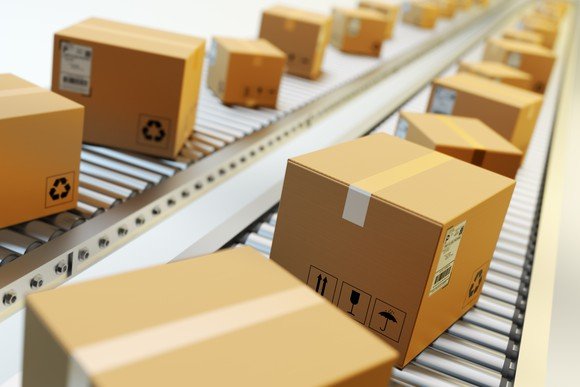3 Unique Applications of Ethereum's Blockchain
Ethereum's blockchain is being tested in a number of exciting ways.
Cryptocurrencies have absolutely captivated the attention of Wall Street and investors since the beginning of 2017. Last year, digital currencies increased in value by 3,300%, ending the year with a combined market cap of $613 billion after beginning with a market cap of less than $18 billion. Even taking into account the recent correction, they've still run circles around traditional equities like stocks and bonds.
Blockchain may offer some major advantages over the current banking system
While there are a plethora of catalysts behind the surge higher in virtual currencies, the emergence of blockchain technology stands above all the rest. Blockchain is the digital, distributed, and decentralized ledger that's responsible for logging all transactions without the need for a financial intermediary like a bank.

The entire reason blockchain moved into the spotlight with the debut of bitcoin was the perception that the current banking system isn't efficient. The system presently allows banks to act as the middleman during a transaction, taking a fee in the process. Furthermore, transactions themselves can take between three to five days to settle if they move beyond domestic borders. That's far too long for a technology-driven business world.
Blockchain brings three major advantages to the table. First, as noted, it's a decentralized network, which simply means that there's no central server or hub where transaction data is kept. Instead, data is stored on hard drives and servers all over the world. The reason for doing this is to ensure that no single entity, or cybercriminal, ever gains control over a cryptocurrency or network.
Second, the use of blockchain works around traditional financial institutions, and thus cuts them out of the equation. Without a middleman, transaction fees are expected to decline.
Finally, but most importantly, the proofing of blockchain-based transactions is ongoing 24 hours a day, seven days a week. This allows blockchain transactions the opportunity to settle in a matter of seconds or minutes as opposed to the days it can sometimes take for cross-border transactions.

Ethereum rises to the top of the blockchain pack
But it's not bitcoin's blockchain that's been busy turning heads in recent years. Instead, it's that of the second-largest cryptocurrency by market cap, Ethereum.
What makes Ethereum so special is its incorporation of smart contract protocols. Smart contracts help to facilitate, verify, or enforce the negotiation of a contract. These protocols allow businesses to customize the Ethereum blockchain to fit their needs, and they're considered to be far more legally binding than traditional paper contracts.
Best of all, smart contract protocols are what allowed blockchain to move beyond the traditional confines of being a currency-only application, as with bitcoin's blockchain, toward being a solution for other industries outside of finance. Don't get me wrong, the Ethereum blockchain works just fine with financial services companies, but that's far from the only industry or sector it's targeting.
In February 2017, the Enterprise Ethereum Alliance (EEA) was formed, allowing enterprises and global organizations to test and evolve Ethereum's blockchain in varying capacity. As of late 2017, the EEA stood 200 members strong, with a number of brand-name companies from a host of industries testing the network in demos and small-scale projects.
Three unique uses for the Ethereum blockchain
While there are countless applications of Ethereum's blockchain, the following three uses are among the most intriguing.
1. Blockchain-based ID
One of the more consumer-friendly applications that's currently being tested is blockchain-based ID. This would come in particularly handy when in airports, and it could wind up making travel considerably more efficient. Rather than handing an airport agent a passport or ID, the traveler, whose travel information and possibly personal information would be protected on an Ethereum-based digital ledger, would be able to access that information to streamline the screening process. This would potentially allow airport personnel and funds to be deployed elsewhere.
Perhaps the broadest application of blockchain ID thus far has come from Zug, Switzerland. Uport, a self-sovereign identity and user-centric data platform, made its platform, which runs on the Ethereum blockchain, available to the citizens of Zug. In effect, there's a real-world application of digital citizenship verification ongoing in Switzerland right now. That's pretty cool.

2. Supply chain management
Perhaps the broadest-based application of the Ethereum blockchain has to do with logistics and supply chain management. As noted, blockchain offers the ability to remove paper from the equation, which is a source of error or fraud. Blockchain data, by comparison, is immutable, meaning it's both transparent and binding (and likely more efficient).
Utilizing the Ethereum blockchain could allow retailers two main advantages. First, the transparency and immutability of blockchain would allow logistics companies and retailers to pinpoint where problems are occurring. Rather than examining copious stacks of paperwork, businesses could efficiently pinpoint deficiencies in their supply chain and correct them quickly.
Additionally, the Ethereum blockchain would allow businesses and consumers the ability to see where goods were at all times, as well as how they performed during quality tests or inspections. It has the potential to be a game changer for the brick-and-mortar retail industry.

3. Internet of Things device management
Lastly, and somewhat building on the previous point, the Ethereum blockchain could do wonders for the Internet of Things (IoT). For those unfamiliar, the IoT describes how wirelessly connected devices can work together to send and receive data.
For example, the Ethereum blockchain could create smart contracts that allow IoT connected devices the ability to order parts, with user authority, to keep themselves running. If an IoT device is broken or has a failing part, it can request the part be ordered or have that command already programmed in via smart contracts. In essence, it's an extension of supply chain management that could trigger machine-to-machine transactions.
Just as intriguing is the idea that the Ethereum blockchain could help determine the trustworthiness of connected devices. With wireless devices regularly entering and leaving a network -- think of newer cars passing through or by a smart city, or consumers walking down a street with their smartphone -- blockchain offers the ability to manage those devices and determine which can be trusted.
Sean Williams
https://www.fool.com/investing/2018/02/08/3-unique-applications-of-ethereums-blockchain.aspx
ETH certainly has some cool technical applications. I hope we see them implemented in the near future!
Wow nice post. Keep em coming. will folloy you for more in the future :)
Steemit group...on wathsapp.. Msg me from Watsapp to upvote following follow for you guys.. No +1 (225) 4172234...... 100% upvote for all posts..download Watsapp app
Great article! Thanks for the info!
Your Post Has Been Featured on @Resteemable!
Feature any Steemit post using resteemit.com!
How It Works:
1. Take Any Steemit URL
2. Erase
https://3. Type
reGet Featured Instantly � Featured Posts are voted every 2.4hrs
Join the Curation Team Here | Vote Resteemable for Witness
Your Post Has Been Featured on @Resteemable!
Feature any Steemit post using resteemit.com!
How It Works:
1. Take Any Steemit URL
2. Erase
https://3. Type
reGet Featured Instantly � Featured Posts are voted every 2.4hrs
Join the Curation Team Here | Vote Resteemable for Witness